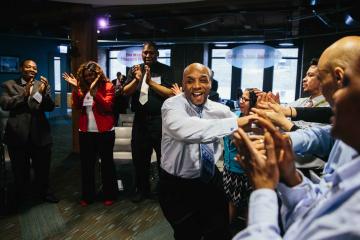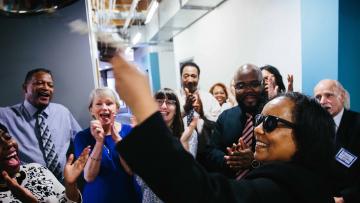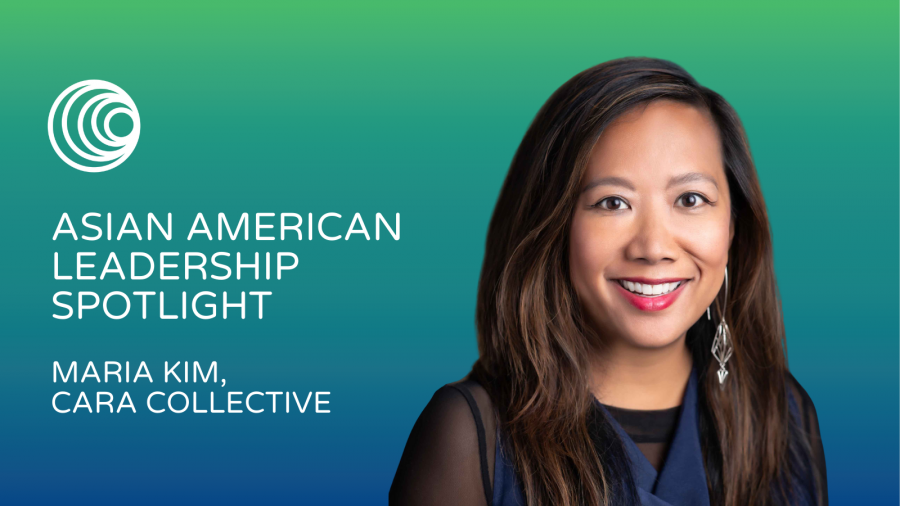In honor of Asian American Pacific Islander Heritage Month, Common Impact is spotlighting members of the AAPI community who are making a difference every day through their careers and social impact work. Today we hear from Maria Kim, President & CEO of Cara Collective, a Chicago-based workforce development nonprofit that engages job seekers, employers, and organizations across the country to break the cycle of poverty through the power and purpose of employment. This year, Cara Collective celebrates its 30th anniversary and 7,300+ individuals placed in 11,500+ quality jobs since its founding in 1991.
Learn more about Cara Collective’s work to build an inclusive economy and watch The Road Up, its documentary on the road out of poverty. Plus, check out ways to volunteer!
You’ve spent 15 years at Cara Collective where you’ve served as President & CEO since 2014. Can you share about how you’ve led during the pandemic and resurgence of the racial justice movement over the past year?
This year has turned all of us upside down and it’s been a year of no playbook when you really thought you could use one. Part of leading is learning; we need to listen and learn as much as we need to lead. As we make it to the other side of this, a lot of people are saying, “I don’t want to go back to normal. I want to go forward to next.” As we do that, we need to really absorb the lessons that we learned in the past year – the lessons we learned as a result of learning and not leading – and have that inform the way we want to lead in the future.
Earlier this year, it was announced that you have accepted a new role you’ll be starting this summer as President of REDF, a national venture philanthropy that invests exclusively in social enterprises focusing on employing and empowering people overcoming barriers to work. Congratulations! Can you share what’s on the horizon for you and REDF?

It’s a bittersweet transition. Cara has my whole heart, so it’s less about me leaving than it is about me going to this opportunity as President of REDF. The reason I’m attracted to it is because it’s about fueling emerging employment social enterprises around the country, what Cara has done over the last decade and a half.
In the last 15 years, I feel like I’ve gone really deep into one practitioner experience and now I want to see what’s possible if we can go really wide. REDF supports over 200 employment social enterprises around the country at various stages of their development. They’re in the business of helping people to find their wings, whether that’s with access to capital, through streamlined policy that levels the playing field for the people that we have the honor to serve (overlooked talent in every community across the country), or through thought partnership to help people in social enterprises do design thinking to grow.
For me, the biggest thing that’s exciting about the opportunity at REDF is they want to invest in leaders of employment social enterprises, but specifically leaders with lived experience. And so, could that be a part of our wealth creation story as a country? That not only are we are we trying to level the playing field in terms of access to opportunity, but we’re also substantively investing in the very leaders with lived experience and saying “we need to learn from you,” not the other way around.
How do we turn upside down the existing paradigms of what leadership is or what our proxies for talent are? Remember that there is treasure and insights in the individuals who have navigated roads of poverty. If we invest in their leadership, that’s the ticket to disrupting some of the challenges we’ve seen so far and to really beginning to stem the tide towards the creation of wealth for communities that have been overlooked for some time.
At the heart of Common Impact’s work is a focus on alleviating inequality, and we know that’s true for both Cara Collective and REDF, as well. Why is that work important to you?

I am about advancing equity for two reasons, one that is systemic and one that is personal. The systemic reason is that we know that based on centuries of systemic injustice in our country, not everyone started at the same place in terms of access to opportunity We need to right that wrong in incremental and significant ways. Personally, I also think that we are all in recovery. Perhaps that’s in recovery from the shock of what the pandemic did to us as a country, as a world. Perhaps its recovery from this racial reckoning that we’re going through.
Sometimes when people hear the term “recovery” they think of it in the context of substance addiction, but recovery is defined as navigating through the other side of loss. We’ve all experienced loss in some form or fashion, so part of what makes me passionate about this work is not just to right systemic wrongs, but also to recognize that individual people are all in recovery. There is more sameness between us than difference. I think part of our cure as a country is equal parts the system and the true and intentional care of each individual and the recognition that we that we are all in recovery.
What is one of the most important leadership lessons you’ve learned?
It’s not about you. Particularly people who have leadership roles or sit at the tippy top of an organizational chart, sometimes we can get it twisted that it’s about us. In actuality, we are merely a steward of something much larger than ourselves. Unless we can see that our job is actually to advance what’s already in motion and being driven by other great people, then I think we’re getting it upside down. As a leader, your job is to steward the greatness of others.
The second lesson I learned came from a series of community events where the facilitator had introduced us to this concept of touchstones, or the agreements that a community must adhere to before they endeavor into an activity together. One of the touchstones was something like: when somebody says something to you that that makes you feel “ick,” turn to wonder. Turn to wonder and ask yourself what makes that person think that way. Ask yourself why you’re having the reaction you’re having as opposed to doing that thing we sometimes do as humans, which is just to downshift and park where we are and not actually be willing to be moved off of our square.
Well, what can we do to turn to wonder? How do we keep exercising that muscle, particularly because we’re in a moment where we can actually create a different and better version of ourselves, our communities, our societies, our workplaces. If we have this opportunity to actually influence that and we’re in that precipice moment right now, then what can we do to test out these skill sets? What can we do to turn to wonder?



